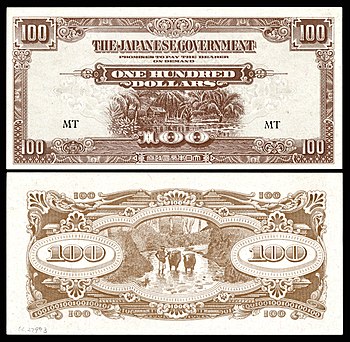The Japanese government-issued dollar was a form of currency issued between 1942 and 1945 for use within the territories of Singapore, Malaya, North Borneo, Sarawak and Brunei, under occupation by Imperial Japan during World War II. The currency, informally referred to as "banana money", was released solely in the form of banknotes, as metals were considered essential to the war effort. The languages used on the notes were reduced to English and Japanese. Each note bears a different obverse and reverse design, but all have a similar layout, and were marked with stamped block letters that begin with "M" for "Malaya". This 1944 one-hundred-dollar Japanese-issued banknote, depicting a Malay house with palm trees on the obverse, and a man with water buffaloes in a stream on the reverse, is part of the National Numismatic Collection at the Smithsonian Institution.
Other denominations:
Banknote design credit: Empire of Japan; photographed by Andrew Shiva
Other denominations:
